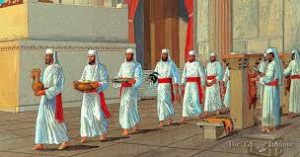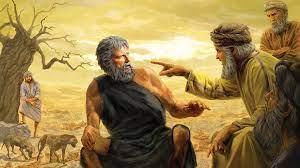Aw – El Mesías es un mejor Sacerdote que Aarón 5:1 a 7:28
El Mesías es un mejor Sacerdote que Aarón
5:1 a 7:28
 El autor demostrará que el sacerdocio de Jesús es superior al sacerdocio levítico por el uso de cinco contrastes. El segundo contraste es que los creyentes tienen un mejor Sacerdote. El sacerdocio de Jesús (Yeshua) es según el Orden de Melquisedec, que es superior al Orden de Aarón. A medida que desarrolla este argumento, el autor interrumpirá este hilo de pensamiento para dar a sus lectores la tercera y la cuarta advertencia a los judíos incrédulos del primer siglo (para ver el enlace, haga clic en Ba – Se han vuelto tardos para oír, y vea Bb – Una vez caído, es imposible volver al arrepentimiento).
El autor demostrará que el sacerdocio de Jesús es superior al sacerdocio levítico por el uso de cinco contrastes. El segundo contraste es que los creyentes tienen un mejor Sacerdote. El sacerdocio de Jesús (Yeshua) es según el Orden de Melquisedec, que es superior al Orden de Aarón. A medida que desarrolla este argumento, el autor interrumpirá este hilo de pensamiento para dar a sus lectores la tercera y la cuarta advertencia a los judíos incrédulos del primer siglo (para ver el enlace, haga clic en Ba – Se han vuelto tardos para oír, y vea Bb – Una vez caído, es imposible volver al arrepentimiento).
Hoy, sin embargo, la Iglesia Romana afirma que el Papa es superior al Orden de Aarón. El Catecismo de Nueva York dice: “El Papa ocupa el lugar de Jesucristo en la tierra. Por derecho divino, el Papa tiene poder supremo y pleno en la fe y la moral sobre todos y cada uno de los pastores y sus rebaños. Él es el verdadero Vicario (Sumo Sacerdote) de Cristo, la cabeza de toda la iglesia, el padre y maestro de todos los cristianos. Es el gobernante infalible, el fundador de los dogmas, el autor y el juez de los concilios; el gobernante universal de la verdad, el árbitro del mundo, el juez supremo del cielo y la tierra, el juez de todos, no siendo juzgado por nadie, el mismo Dios en la tierra”. Así, la Iglesia Romana sostiene que el Papa, como Sumo Sacerdote de Cristo en la tierra, es el gobernante del mundo, supremo no solo sobre la Iglesia Romana misma sino sobre todos los reyes, presidentes y gobernantes civiles, verdaderamente sobre todos los pueblos. y naciones del mundo.
La triple corona que lleva el Papa simboliza su autoridad en el cielo, en la tierra y en el inframundo (como rey del cielo, rey de la tierra y rey del infierno) ya que, aunque sus absoluciones admiten a las almas en el cielo, en la tierra él intenta ejercer tanto el poder político como el espiritual. Y a través de su jurisdicción especial sobre las almas en el purgatorio y su ejercicio del “poder de las llaves”, puede liberar de más sufrimiento a las almas que le plazca, y dejar que sigan sufriendo a aquellas a las que le niega la libertad, las decisiones que toma en la tierra están supuestamente ratificadas en el cielo. En su calidad de “cabeza de la iglesia”, sentado en su silla papal, el Concilio Vaticano de 1870 lo declaró infalible. Vea también el comentario sobre La vida de Cristo Fx – Sobre esta roca edificaré mi iglesia.
Pero la falacia de esta afirmación se puede ver fácilmente en el evidente contraste entre Jesús y cualquier Papa. El Papa usa, como símbolo apropiado de la autoridad que él reclama, una corona cargada de joyas, extremadamente cara, mientras que Cristo no tenía corona terrenal en absoluto, excepto una corona de espinas que usó por nosotros. El Papa es llevado en su “Papa móvil”, mientras que Yeshua caminó a todas partes a donde Él tenía que ir. El Papa es adorado con genuflexiones (una inclinación de rodilla en reverencia), donde la Biblia dice que en el nombre de Jesús se doble toda rodilla de los que están en los cielos, y en la tierra, y debajo de la tierra, y toda lengua confiese que Jesús el Mesías es el Señor para gloria de Dios Padre (Filipenses 2:10-11). El Papa vive lujosamente con muchos sirvientes en un enorme palacio en la Ciudad del Vaticano, mientras que Cristo, cuando estuvo en la tierra, no tiene dónde recostar Su cabeza (Mateo 8:20b). Muchos papas, particularmente durante la Edad Media, eran extremadamente inmorales, mientras que Cristo era perfecto en santidad. El Mesías dijo: Mi Reino no es de este mundo (Juan 18:36) y se negó a ejercer la autoridad mundana. Pero el papa es un gobernante mundano, como un pequeño rey, con su propio país, su propio sistema de tribunales, sirvientes, moneda, servicio postal y una guardia militar suiza que sirve con uniformes del siglo XVI como guardaespaldas papal. Besar los pies del Papa comenzó con el Papa Constantino en el 709 dC, mientras que Jesús (Yeshua) Mesías lavaba los pies de Sus discípulos (vea el comentario sobre La vida de Cristo Kh – Jesús lava los pies de sus discípulos).
El hecho es que la Comunidad Mesiánica primitiva no tenía un sistema de sacerdotes designados en la tierra, para resolver cuestiones legales difíciles según las leyes de Dios (Deuteronomio 17:8-10, Segunda de Crónicas 19:8-10). Hubo un problema doctrinal en Antioquía. ¿Qué debería hacer la Comunidad Mesiánica para resolverlo? ¿Deberían escribir una carta a Pedro pidiendo su decisión? Esta sería la posición romana. Pero no, no lo hicieron. ¿Deberían escribir una carta al “colegio de los apóstoles”? No, ellos tampoco hicieron eso. Más bien, enviaron representantes para reunirse en Jerusalén, donde los apóstoles y los ancianos se reunieron para considerar el asunto (vea el comentario sobre Hechos Bs – El concilio de Jerusalén). Lo consideraron cuidadosamente con oración y estudiando las Escrituras. Finalmente se decidieron por una acción, enviaron una carta y esperaron que la comunidad mesiánica se sometiera a su decisión según Hechos 16:4 (vea el comentario sobre Hechos Bt – La carta del concilio a los creyentes gentiles). No hubo primacía de Pedro ni de nadie más. En cambio, hubo una reunión de los líderes ordenados de la Comunidad Mesiánica para juzgar los asuntos de acuerdo con la Palabra de Dios. Esta es la respuesta bíblica a la posición católica romana de que Pedro fue el primer papa. Por lo tanto, en el análisis final, el Mesías no solo es mejor Sumo Sacerdote que Aarón, ¡sino también mejor Sumo Sacerdote que el Papa!126
PÁGINA SIGUIENTE: Requisitos para el Gran Sumo Sacerdote Ax



 Pero hay otra forma en que el Mesías es mejor que Aarón. Los eventos que tuvieron lugar cuando Jesús traspasó los cielos, muestran que Él es infinitamente mejor que Aarón. Aarón nunca podría haber realizado tal hazaña. La referencia aquí es a la resurrección de nuestro Señor de la tumba, y después de cuarenta días, Su ascensión del monte de los Olivos al cielo como Sumo Sacerdote habiendo hecho expiación por el pecado en la cruz (vea el comentario sobre
Pero hay otra forma en que el Mesías es mejor que Aarón. Los eventos que tuvieron lugar cuando Jesús traspasó los cielos, muestran que Él es infinitamente mejor que Aarón. Aarón nunca podría haber realizado tal hazaña. La referencia aquí es a la resurrección de nuestro Señor de la tumba, y después de cuarenta días, Su ascensión del monte de los Olivos al cielo como Sumo Sacerdote habiendo hecho expiación por el pecado en la cruz (vea el comentario sobre  Aquí comienza el pasaje expositivo más largo de Hebreos. Su misma longitud sugiere su importancia. Su tema es el tema central del libro. El recurso verdadero de la comunidad mesiánica que lucha, en medio de sus presiones, es el sumo sacerdocio del Mesías. Deben darse cuenta de la grandeza de ese sacerdocio, su superioridad sobre el sacerdocio levítico y el acceso perfecto que tuvieron a él sobre la base de la muerte de Yeshua.116
Aquí comienza el pasaje expositivo más largo de Hebreos. Su misma longitud sugiere su importancia. Su tema es el tema central del libro. El recurso verdadero de la comunidad mesiánica que lucha, en medio de sus presiones, es el sumo sacerdocio del Mesías. Deben darse cuenta de la grandeza de ese sacerdocio, su superioridad sobre el sacerdocio levítico y el acceso perfecto que tuvieron a él sobre la base de la muerte de Yeshua.116 Porque así dijo en algún lugar respecto al séptimo día:
Porque así dijo en algún lugar respecto al séptimo día: Por lo cual, así como dice el Espíritu Santo (3:7a). La expresión por lo cual se remonta a los tres argumentos precedentes. En vista del hecho de que el Mesías es mayor que los profetas (1:1-3), mayor que los ángeles (1:4-14) y mayor que Moisés (3:1-6), la advertencia es:
Por lo cual, así como dice el Espíritu Santo (3:7a). La expresión por lo cual se remonta a los tres argumentos precedentes. En vista del hecho de que el Mesías es mayor que los profetas (1:1-3), mayor que los ángeles (1:4-14) y mayor que Moisés (3:1-6), la advertencia es: 















